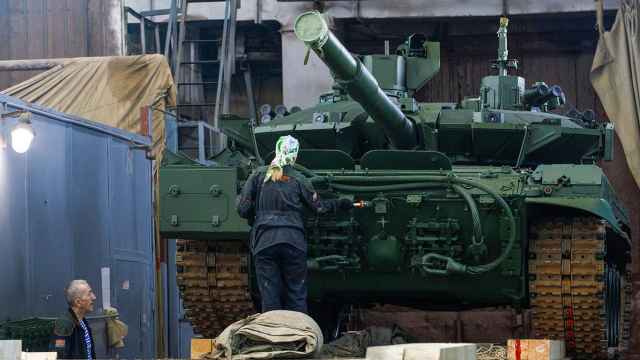Consumer goods giant Unilever said Friday that it had agreed to buy Russia's largest beauty products manufacturer — Yekaterinburg-based Kalina — for 500 million euros ($700 million), as the Anglo-Dutch company seeks to strengthen its position on the $9 billion Russian cosmetics market.
Unilever, which has been operating in Russia since 1992, will first purchase 82 percent of Kalina for 390 million euros and plans to make a mandatory offer to acquire the remaining stake after closing the initial phase of the deal by the end of this year, the companies said in a joint statement.
Kalina's valuation — which, according to the statement, puts the company at 11.7 times its expected pre-acquisition earnings before interest, taxes, depreciation and amortization — is rather high, but largely justified by the benefits Unilever will get from the deal, analysts said.
Unilever is offering a significant premium to Kalina's market price as it stood before the announcement, but the high valuation results from the size of the deal and the prospects it provides for Unilever, Finam analyst Maxim Klyagin said.
The premium is being paid for acquiring control of a well-functioning enterprise and getting a significant market share, as well as the value of the brands in the portfolio Unilever will get, said Natasha Zagvozdina of Renaissance Capital.
The deal, which is pending regulatory approval, will result in Unilever strengthening its local offering and enhancing its presence in the promising Russian market, said the company's chief executive Paul Polman.
The acquisition "will transform Unilever's personal care business in Russia, giving us leading positions in skin care and hair care, as well as establishing a presence in oral care," he said in the statement.
"It will also strengthen and rebalance Unilever's portfolio and competitive position in Russia, an emerging market with considerable potential and one of our priority countries," he said.
The deal will add to Unilever's portfolio such local brands as Pure Line, Black Pearl, Silky Hands, 100 Recipes of Beauty and Forest Balm. The company's Russian portfolio now includes brands like Dove, Sunsilk, Timotei and Clear.
"Kalina is undoubtedly one of the top companies in the cosmetics market. Such an acquisition will allow Unilever to increase its market share significantly," Klyagin said.
Kalina's expected turnover this year is 303 million euros ($420 million), according to the statement.
With 1,900 employees, Kalina is headquartered in Yekaterinburg, Siberia, where it also has a manufacturing facility.
Unilever said the acquisition would make it the second-largest player in the country's market for personal care products after Procter & Gamble.
The purchase will boost the company's share in the hand and body care segment from the current 3 percent to 37 percent by sales volume, Unilever said in e-mailed comments.
The combined company will also have 22 percent market share in hair care products, which will make it the No. 1 player in this segment, followed by L'Oreal, Schwarzkopf and Beiersdorf. The deal will also result in Unilever entering the facial care segment, with a 33 percent share, the company said.
Following the news, Kalina was the biggest gainer on MICEX on Friday, having skyrocketed 40 percent to 3,077 rubles ($99) at the close — the highest price since it started trading in 2004.
Unilever gained 2.3 percent, closing at 24.6 euros in Amsterdam.
The deal between Unilever and Kalina is the latest in a row of acquisitions by big foreign companies seeking to expand their business in the domestic consumer goods market over the last couple of years.
Coca-Cola acquired local juice maker Nidan Soki in September 2010, then rival PepsiCo bought a controlling stake in Russia's biggest juice and dairy producer Wimm-Bill-Dann for $3.8 billion in December of the same year.
"We see the continuation of a trend of foreign strategic buyers that are already present in Russia expanding their businesses by buying domestic segment leaders with strong local brand portfolios, products and production assets, extensive national distribution networks, transparent accounts and strong management teams," Renaissance Capital said in a note Friday.
The trend is likely to continue in the future, with alcohol maker Synergy, sea food producer Russian Sea, drug maker Pharmstandard, as well as retailers M.Video, O'Key and X5 Retail Group being potentially interesting for foreign companies seeking to enhance local presence, the note said.
Unilever, which bought domestic ice cream producer Inmarko in 2008 and ketchup maker Baltimor in 2009, declined to comment on Friday on whether it plans more local acquisitions in the future, saying only that it is "committed to grow in the country."
"We are always interested in bolt-on acquisitions that will complement and boost our existing portfolio and geographic footprint," it said in e-mailed comments.
Unilever, which has about 7,000 employees in Russia, has already invested almost 1 billion euros locally, according to the company's web site.
The local cosmetics market is very promising and provides good opportunities for growth, said Finam's Klyagin, adding that analysts estimate the current market size at about $9 billion.
The market, which slightly declined in 2009 as a result of the financial crisis, is demonstrating stable growth.
Cosmetics and perfume sales increased 5.2 percent in 2010, followed by 13 percent growth in the first half of this year compared with the first six months of 2010, according to the State Statistics Service.
Sales could see compounded annual growth of 5 percent to 10 percent over the next six years, with increasing demand resulting from improving standards of living, Klyagin said.
A Message from The Moscow Times:
Dear readers,
We are facing unprecedented challenges. Russia's Prosecutor General's Office has designated The Moscow Times as an "undesirable" organization, criminalizing our work and putting our staff at risk of prosecution. This follows our earlier unjust labeling as a "foreign agent."
These actions are direct attempts to silence independent journalism in Russia. The authorities claim our work "discredits the decisions of the Russian leadership." We see things differently: we strive to provide accurate, unbiased reporting on Russia.
We, the journalists of The Moscow Times, refuse to be silenced. But to continue our work, we need your help.
Your support, no matter how small, makes a world of difference. If you can, please support us monthly starting from just $2. It's quick to set up, and every contribution makes a significant impact.
By supporting The Moscow Times, you're defending open, independent journalism in the face of repression. Thank you for standing with us.
Remind me later.





